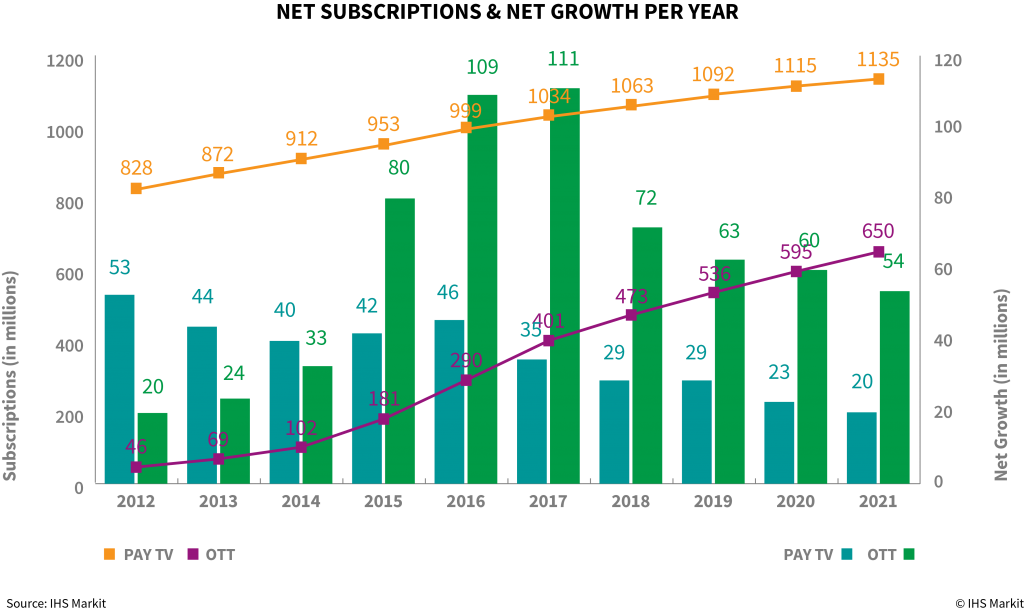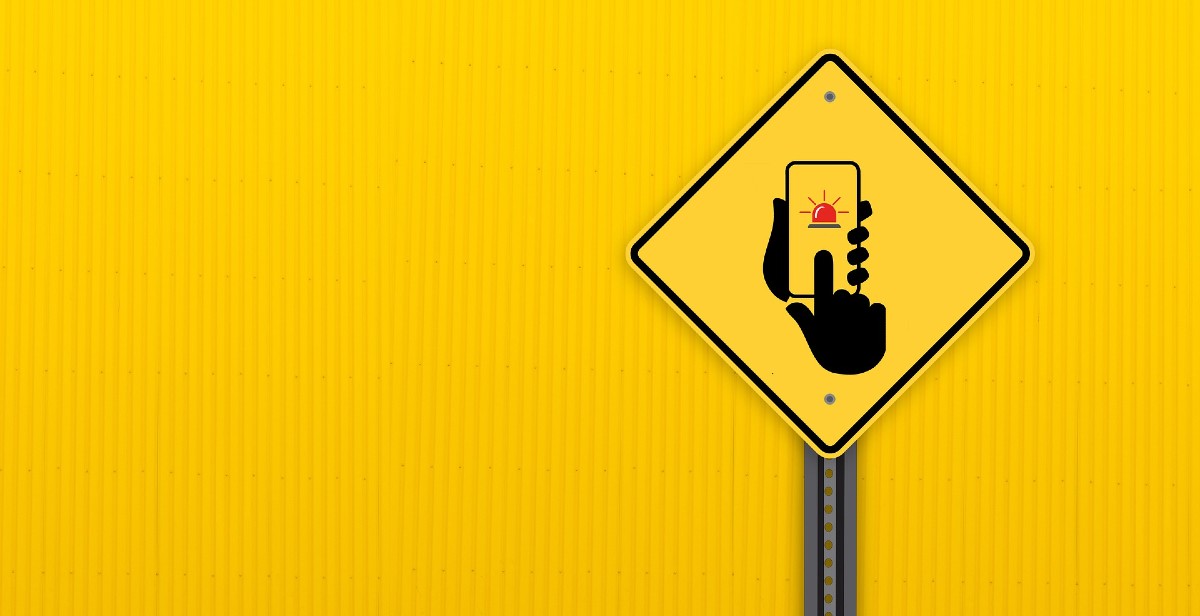In this week’s Week in Review: MTG announced plans to split in two, Tencent claims to be China’s top video platform, and the US Department of Justice’s antitrust suit against AT&T begins . To receive an update on the industry’s top stories every Friday, sign up to the weekly Video Round-Up.
Top Stories
Modern Times Group to Split in Two
Modern Times Group announced this morning that it intends to split into two separate companies: Modern Times Group MTG AB and Nordic Entertainment Group. The company will distribute all shares in Nordic Entertainment Group (made up of MTG Nordic Entertainment, MTG Studios and Splay Networks) to MTG’s shareholders, with these shares listed on Nasdaq Stockholm.
Modern Times Group MTG AG will contain MTG’s esports, gaming and digital entertainment properties, while Nordic Entertainment Group will focus on broadcasting and studio production. David Chance, chairman of the board at MTG, says the company has managed to transform from a traditional national broadcaster into a “global digital entertainer”, having become a major player in esports through properties including ESL and DreamHack. “Now is the right time to initiate a split of MTG into two separate and listed companies, in order to maximise the focus and potential of each group for the benefit of owners, customers and employees,” he said. MTG’s share price rose by nearly five percent in the wake of the announcement.
Tencent Bypasses Baidu to Become China’s Top Video Platform
Chinese tech giant Tencent claimed this week that paid subscriptions for its online video platform have reached 62.59 million, overtaking Baidu’s iQIYI service. The numbers suggest that Tencent has added 20 million subscribers in just five months, and has very quickly managed to build a substantial lead over iQIYI, which claims a paid subscriber base of 50.8 million.
iQIYI meanwhile revealed it aims to raise up to $2.4 billion through its initial public offering on the Nasdaq Global Market. Baidu will retain its controlling stake in the company, and says money raised will be spent on expanding iQIYI’s catalogue of content, and on investment in the platform’s technology.
AT&T v DoJ Trial Kicks Off
The US Department of Justice’s antitrust case against AT&T’s proposed $85 billion purchase of Time Warner kicked off this week, with DoJ lawyer Craig Conrath telling the court that the takeover would hike pay TV costs for consumers by over $400 million annually, working out as a $0.45 monthly increase for pay TV subscribers. But while Conrath claimed that an enlarged AT&T would “squelch” the competition, AT&T’s representative Daniel Petrocelli said the government’s case is “fundamentally stuck in the past”, and that the deal would actually lead to a 50 percent decrease in prices for pay TV subscribers.
The Justice Department called Cox Communications buyer Suzanne Fenwick as its first witness, who said she fears she’ll be forced to pay higher prices for Time Warner’s “must-have content”, while Petrocelli claimed Fenwick had not conducted “a single bit of quantitative analysis” to show that her company need access to Time Warner’s content to prevent customers migrating to AT&T’s DirecTV.
The Week in Tech
MRC Considers Switch to “Duration Weighting” for Video Viewability Standard
The Media Ratings Council announced this week it is considering updating its viewability standards, issuing a call on Tuesday for research into what kind of impact new standards might have. For video, the council is looking specifically into the idea of “duration weighting”, asking whether different segments of a video ad contribute differently to its effectiveness, and other questions around which time-related elements contribute to an “effective exposure” of a video ad. This research could lead the MRC to move on from its current video viewability standard, where 50 percent of an ad’s pixels must be seen for two consecutive seconds by the consumer to constitute an impression. The council is also considering adopting a new standard for display advertising, asking for data on the importance of 100 percent of a display ad’s pixels being seen by the consumer.
Teads Posts 53 Percent Growth One Year After Altice Buyout
Outstream specialist Teads announced on Wednesday that it recorded 53 percent top-line growth in 2017, with revenue reaching $317 million for the full year. The company was acquired by Dutch telco Altice in March last year for $307 million, and says it has managed to grow its reach considerably since the buyout despite “a turbulent year for the ad tech industry”.
Teads claims to now reach an audience of 1.2 billion monthly unique visitors, including 800 million on mobile, with comScore saying it now has a greater reach than Verizon’s video properties and Adobe’s Tubemogul. Read the full story on VAN.
Four in Five Annoyed by Ads Not Tailored for Mobile says IAB
Seventy-eight percent of consumers are annoyed by ads which aren’t tailored for smartphones according to new research from IAB, with 37 percent blaming the publisher and 33 percent blaming the advertiser. On the flip side, optimised mobile ads were found to increase brand consideration by 56 percent, and brand preference by 44 percent, compared to non-optimised ads.
The research also found that shorter, optimised online video ads are more likely to be watched in full and perceived as creative, engaging and attention-grabbing than longer 30 second TV ads.
Meetrics Selected as First European Video Viewability Partner for Facebook and Instagram
London-based viewability measurement company Meetrics announced today it has been picked as the first non-US company to measure video viewability on both Facebook and Instagram. Facebook first introduced third party measurement for video ads through a partnership with Moat back in 2015, and has since added comScore and Integral Ad Science to the roster, but Meetrics will be the first European partner to measure video viewability.
Meetrics’ data will give advertisers insight into the viewability of video ads both in terms of what percentage of the video unit is visible on screen, and what percentage of the advert is watched, for both mobile and desktop.
SpotX Granted Renewal of TAG Certifications
SpotX announced on Thursday that it has been granted certification renewal by the Trustworthy Accountability Group (TAG) for all official seals including the Certified Against Fraud Seal, Certified Against Malware Seal, the Certified Against Piracy Seal, and the Certified Inventory Quality Guidelines (IQG) Seal. TAG is a cross-industry accountability programme designed to eliminate fraudulent traffic, combat malware, prevent internet piracy, and promote greater transparency across the digital advertising supply chain. SpotX says the renewed certification shows its ongoing commitment to fight fraud and improve brand safety in video advertising.
The Week in TV
Spanish Broadcasters Combine for OTT TV Offering to Rival Digital Streaming Services
Spanish broadcasters RTVE, Atresmedia and Mediaset España revealed this week that they will launch a joint over-the-top (OTT) TV offering. The three will initially group together content on a joint interactive TV platform based on the HbbTV connected TV standard, which will essentially introduce new functionality to RTVE’s existing red button service while also bringing in content from Mediaset and Atresmedia. Once this is established, the companies will launch a new OTT platform, where each will contribute their own programming to offer a service which they hope can rival the likes of Netflix and Movistar+.
Liberty Global and Sunrise Communications Considering Swiss Partnership
European cable company Liberty Global and Swiss telecoms business Sunrise Communications Group AG are reportedly in talks about a possible partnership to combine and expand their business in Switzerland, according to a Bloomberg report. Talks are still at an early stage, and there is no guarantee that a deal will be reached, but Sunrise investors reacted negatively to the news as many had been expecting a potential takeover of the company by Liberty. The deal would be similar to Liberty Global’s 2016 agreement with Vodafone, which saw the two combine their Dutch business, consolidating their internet, TV and mobile services into one provider.
OTT Attracting Sign-Ups Three Times Faster than Pay TV says IHS Markit
Over-the-top (OTT) services are attracting three times as many new sign-ups globally as pay TV, according to new research released by IHS Markit. The report found that global digital pay TV subscriptions, including cable, satellite and IPTV, exceeded one billion for the first time last year, but that the number of new OTT subscriptions outstripped the number of new pay TV subscriptions in most regions. “Traditional pay TV operators have shown resilience in the face of increased competition, through continued investment in set-top functionality, exclusive content and on-demand services,” said IHS Markit’s associate director of television media Fateha Begum.
The Week in Publishing
Facebook Stocks Plummet Over Cambridge Analytica Scandal
Around $46 billion was wiped off of Facebook’s value over the course of the week after stories in the New York Times and The Observer claimed that 50 million Facebook users’ data had been sold to Cambridge Analytica by Cambridge academic Dr. Aleksandr Kogan. The two stories claimed that Kogan obtained legitimate access to Facebook user data via a personality quiz app, but then sold the data to Cambridge Analytica. A separate Channel 4 report on Monday then claimed that Cambridge Analytica had used bribes and sex workers to entrap politicians.
While Facebook founder and CEO Mark Zuckerberg remained silent for a few days, UK MPs summoned him to answer for a “catastrophic failure of process” before a parliamentary committee, while several US senators called for him to appear before Congress. Finally on Wednesday Zuckerberg broke his silence, issuing an apology and saying “we have a responsibility to protect your data, and if we can’t then we don’t deserve to serve you”.
Here’s what Scott Galloway, a clinical professor of marketing at the New York University Stern School of Business, says about the scandal:
Google Announces New Initiative to Combat Fake News
Google announced this week it’s investing $300 million over the next three years in the ‘Google News Initiative’, a news programme designed to stem the tide of fake news and help news media businesses. The company lists the three objectives of the initiative as:
- Elevating and strengthening quality journalism
- Evolving business models to drive sustainable growth
- Empowering news organisations through technological innovation
Alongside increased efforts to cut out misleading news and promote trustworthy sources, Google is launching ‘Subscribe with Google’, where consumers will be able to subscribe to paid titles via their Google accounts, similar to how many sites already have a ‘sign in with Google’ feature. Google says the new feature will make subscribing to news titles easier, and lists the Financial Times, The Telegraph, The New York Times and The Washington Post among its launch partners.
Meredith to Sell Off Time Inc. Titles
Meredith Corp, which completed its takeover of Time Inc. in January, has revealed that it plans to sell off Time Inc. titles Sports Illustrated, Time, Fortune, and Money, as it looks to align Time’s portfolio and strategy with its own. The company also laid off around 200 employees on Wednesday, and plans to get rid of 1,000 more positions over the rest of the year as it seeks to save up to $500 million in costs. Meredith president and CEO Tom Harty says the sales will allow his company to present a more streamlined advertising offering, and that the brands up for sale have already attracted potential suitors.
YouTube Reportedly Plans to Ramp Up Ads on Music Videos
YouTube is reportedly planning to increase the number of ads users see on music videos in an effort to push consumers into subscribing for upcoming paid music subscription service. The heavier ad load will be targeted specifically at users who use YouTube as a music streaming service, according to a Bloomberg report, with YouTube’s global head of music Lyor Cohen saying he plans to “frustrate and seduce” users into the paid offering.
The Week for Agencies
Publicis Groupe Pivots Towards Consulting
Publicis Groupe unveiled its new ‘2020: Sprint to the Future‘ strategy this week in which it suggested it will look to pivot further into consulting over the coming three years. The plan outlined three key areas of growth for the company over the next three years: its ‘PeopleCloud’ platform which identifies sources of client growth, “dynamic creativity” which will customise creative to individuals at each stage of a purchase journey, and technology and consulting via its digital business transformation arm Publicis.Sapient. CEO Arthur Sadoun said in a video message sent out to employees this week that the company wants to become “the indispensable partner to our clients in their transformation,” and that Publicis will look to make acquisitions “in the fields of data, dynamic creativity and digital business transformation.”
TRUTH Launches its First Blockchain Enabled Ad Campaign
TRUTH, a London-based agency launched late last year which uses “blockchain-enabled smart contracts” to power campaigns, announced on Wednesday that it has run what it claims to be the world’s first blockchain-enabled ad campaign. This first campaign was bought by an undisclosed brand, spending out of a campaign test budget, and delivered on a UK-based publisher’s site. The ads were traded through Sonobi’s ad exchange, through demand-side platform (DSP) Avocet, and the campaign ran for ten days until March 19th.
The agency claims that its use of blockchain to power smart contracts make its campaigns 100 percent transparent. Smart contracts automatically execute transactions once the terms of a contract are met, and the use of blockchain means all transactions can be seen and tracked by all parties involved. Read the full story on VAN.
Martin Sorrell Predicts Broadcaster Mergers to Have Big Impact on Agency Structure
WPP’s chief executive Martin Sorrell, speaking this week at AdWeek Europe, predicted that mergers between large media companies will have a knock on effect in the agency sphere, saying that consolidation in adland will “continue to be inextricably, driven by the media side of the equation”. Sorrell suggested that deals such as Disney’s takeover of Fox, Comcast’s attempted takeover of Sky and AT&T’s attempted merger with Time Warner will open up new opportunities for agencies like his own, and that they are likely to favour larger companies.
Partnerships of the Week
ProSieben and Discover Expand Joint 7TV Service
ProSiebenSat.1 and Discovery have expanded their joint German streaming platform, 7TV, adding sports channel Sport1, news channel WELT and documentary channel N24 Doku to the service. These are the first third-party channels added to 7TV’s lineup, which offers both linear TV livestreams and catch-up content from participating channels. “The new content partners underscore our persistent strategy of an open approach and our endeavour to create the VOD platform for German speaking TV content and live TV for all digital channels through 7TV,” said Alexander Vassilev, CEO of 7TV.
Akamai Partners with SonyLIV and Enables Dynamic Ad Insertion for Live Cricket
Akamai Technologies Inc. has announced a partnership with Sony’s Indian video on-demand (VOD) service SonyLIV which saw Akamai’s dynamic ad insertion (DAI) capabilities leveraged during the India-South Africa cricket series held over January and February 2018. Akamai’s DAI offering is powered by Yospace as part of an ongoing partnership between the two companies.
SonyLIV was the official and exclusive mobile and internet broadcaster for the India Tour of South Africa series and says it delivered coverage to millions of users across a variety of devices. The company claims to have achieved a near 100 percent ad fill rate without compromising on the viewing experience for users.
Hires of the Week
Dominique Delport Heads to Vice
Havas veteran Domique Delport, who serves as the company’s global managing director as well as president of Vivendi Content, is leaving the company to join Vice as its head of international operations. Delport will be based in Vice’s London office and will report directly to Vice’s new CEO Nancy Dubec, according to Variety.
Adform Announces Leadership Changes
Ad tech platform Adform has promoted Oliver Whitten in his role as chief operating officer (COO), expanding the role to include global revenue, operationgs across Global Holing Groups, and marketing. The company has also promoted Holger Mews to chief revenue officer and Louise Kloster to VP of marketing, while Rick Hones’ role as SVP of Nordics and the UK has been expanded to include Benelux.
OpenX Hires Gavin Stirrat as VP Europe Partner Services
OpenX has hired Gavin Stirrat, who’s previously worked for Voluum, StrikeAd and Sizmek, as its new VP of partner services in Europe. The company says the appointment comes after a year in which its EU business grew by 33 percent, and during which it added 95 new publisher partnerships.
The Week on Van
A Guide to Advertising’s Blockchain Start-Ups, read more on VAN
Analysts Say Advertisers Won’t Flee Facebook, But its Users are Revolting, read more on VAN
Teads Posts 53 Percent Growth One Year After Altice Buyout, read more on VAN
TRUTH Launches its First Blockchain Enabled Ad Campaign, read more on VAN
McDonald’s the Latest Brand to Fall Victim to Ad Fraud, read more on VAN
Ad of the Week
Raymond, It All Begins With Black, Grey India
Textile company Raymond pitches its ‘All Black’ collection with this ode to the colour black. The words spoken in the ad taken on added significance at the end as it’s revealed the narrator is visually-impaired singer and writer Jugpreet Singh Bajwa.





